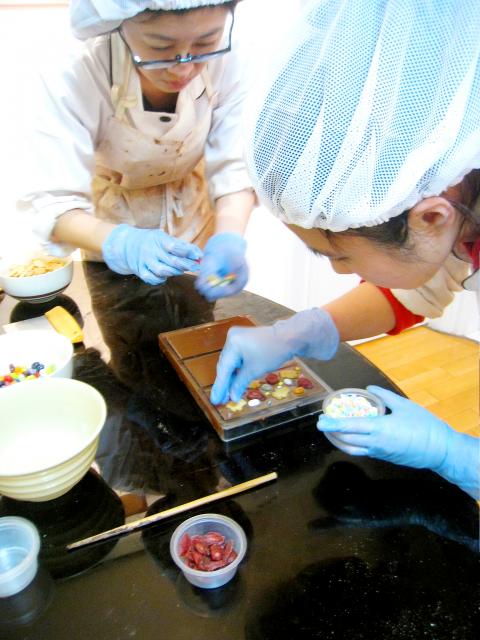You would have thought that Taiwanese would already be spoilt for choice in shopping for chocolate. Many of the big international brands are prominently represented here, from run-of-the-mill Cadbury chocolate bars, through slightly more sophisticated brands such as Lindt, then onward and upward through premium brands such as Godiva and Royce, up to handcrafted super premium chocolates such as Jean-Paul Hevin. The price range and selection is huge, but one thing is pretty much constant: you choose from chocolates that have been designed and created by others.
ChocoForAll, a small Internet-based business that recently opened in Taipei, aims to give greater freedom of choice to shoppers, allowing them the opportunity to add their own ingredients and design elements to their chocolate bars from a choice of over 120 ingredients. Although ChocoForAll have only been in operation for just over six months, Douglas Ma (馬子超), co-founder of ChocoForAll, said that they have already been run off their feet over the Christmas, New Year and Valentine’s festive season, as people sought a new way of providing a novel gift that conveyed something more than just a whole load of calories.
Ma, a Taiwanese American back home after completing a business degree in the US, said that Taiwan is an ideal place for such a venture, not least because of a pervasive Internet culture and a well developed acceptance of shopping online.

Photo courtesy of ChocoForAll
“I think one of the great things about Taiwan (for us) is that it is a small country. Basically, if something catches on it is going to spread like wildfire. … All of Taiwan will know about it very soon. … In the US, you probably would need to spend a lot more time establishing yourself in the market,” Ma said. He emphasized the importance of blogs in spreading the word about ChocoForAll, saying that when people see something special on a blog, or a celebrity is seen using a product and the image is posted, people catch on to the new product very quickly.
Another factor that has allowed the young company to get such a good start has been the importance of food in Taiwanese life. “The great thing about Taiwan is that food is such an important part of the culture,” Ma said. “As long as it’s a great idea for food, the market will probably be able to accept it. … We didn’t want to do traditional retail, as there is just too much competition in the food and beverage sector, but we saw that there was no e-commerce operation focusing on chocolate. A lot of the big brands sell online, but that is not their focus,” Ma said.
The basis for the system at ChocoForAll is to visit the Web site’s “creation station” and select your choice of dark, milk or white chocolate, then choose up to five ingredients that can be added to the bar. This includes everything from conventional choices such as various kinds of nuts and dried fruit, to the exotic or even bizarre, such as curry powder, jellybeans, mochi and gold leaf.

Photo courtesy of ChocoForAll
The potential to make unique combinations is unlimited, and Ma said that they try their best to meet these requirements. “We’ve had some crazy requests that we have not been able to accommodate,” Ma said, but the company is constantly collecting information about what people want, “and if there is enough demand for an ingredient to be included in a chocolate, we will offer it.”
Ma added that while many of the ingredients and decorations are imported from the US, the company has also made a big effort to include Taiwanese products, particularly local dried fruits, and one of their most popular items is mochi, which introduces that chewy texture so much beloved of Taiwanese.
Valentine’s Day proved a spur for innovation. For this festival, ChocoForAll introduced a Valentine’s His and Her chocolate bar set, began selling chocolate lollipops, and also launched a short message service so that chocolate bars can include a customized name or short message.

Photo courtesy of ChocoForAll
Ma said that they had received lots of feedback from early customers asking if the company offered anything smaller than a standard-sized chocolate bar, which some felt was too big. The lollipops, sized at about two or three mouthfuls, but with all the mix of ingredients that a customer chooses, have already met with considerable success.
The writing service, which was originally launched as a special service for Valentine’s day, had such a great response that the company is now planning to offer it as a regular part of its services. Originally, the message could only be made up of a specific selection of words, but customer pressure has enlarged the scope to include simple Chinese and even words in Korean.
The option to be personal with chocolate is a great attraction, according to Ma. “Customization is something that most people will appreciate. It’s all about having choices.”

Photo courtesy of ChocoForAll
More information about ChocoForAll can be found in English and Chinese at www.chocoforall.com.

In recent weeks the Trump Administration has been demanding that Taiwan transfer half of its chip manufacturing to the US. In an interview with NewsNation, US Secretary of Commerce Howard Lutnick said that the US would need 50 percent of domestic chip production to protect Taiwan. He stated, discussing Taiwan’s chip production: “My argument to them was, well, if you have 95 percent, how am I gonna get it to protect you? You’re going to put it on a plane? You’re going to put it on a boat?” The stench of the Trump Administration’s mafia-style notions of “protection” was strong

Every now and then, it’s nice to just point somewhere on a map and head out with no plan. In Taiwan, where convenience reigns, food options are plentiful and people are generally friendly and helpful, this type of trip is that much easier to pull off. One day last November, a spur-of-the-moment day hike in the hills of Chiayi County turned into a surprisingly memorable experience that impressed on me once again how fortunate we all are to call this island home. The scenery I walked through that day — a mix of forest and farms reaching up into the clouds

With one week left until election day, the drama is high in the race for the Chinese Nationalist Party (KMT) chair. The race is still potentially wide open between the three frontrunners. The most accurate poll is done by Apollo Survey & Research Co (艾普羅民調公司), which was conducted a week and a half ago with two-thirds of the respondents party members, who are the only ones eligible to vote. For details on the candidates, check the Oct. 4 edition of this column, “A look at the KMT chair candidates” on page 12. The popular frontrunner was 56-year-old Cheng Li-wun (鄭麗文)

“How China Threatens to Force Taiwan Into a Total Blackout” screamed a Wall Street Journal (WSJ) headline last week, yet another of the endless clickbait examples of the energy threat via blockade that doesn’t exist. Since the headline is recycled, I will recycle the rebuttal: once industrial power demand collapses (there’s a blockade so trade is gone, remember?) “a handful of shops and factories could run for months on coal and renewables, as Ko Yun-ling (柯昀伶) and Chao Chia-wei (趙家緯) pointed out in a piece at Taiwan Insight earlier this year.” Sadly, the existence of these facts will not stop the